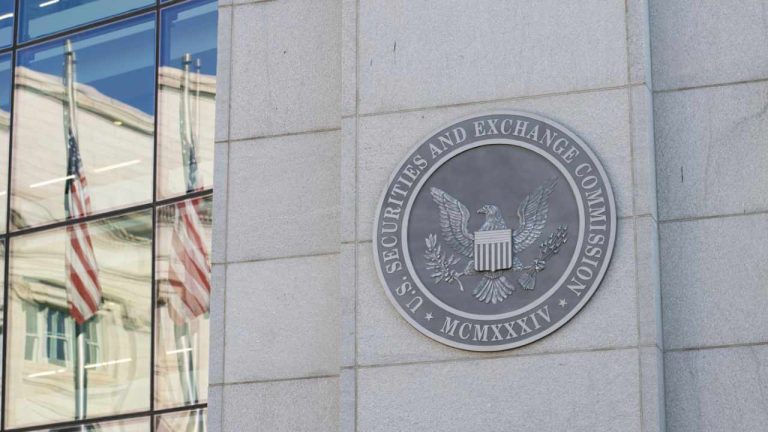 A former SEC enforcement chief has called for Chair Gary Gensler to resign and end crypto enforcement, citing Trump’s victory and stating: “the people have spoken.” Former SEC Enforcement Chief Wants Gary Gensler Step Down and Crypto Cases End Former chief of the U.S. Securities and Exchange Commission (SEC) Office of Internet Enforcement, John Reed […]
A former SEC enforcement chief has called for Chair Gary Gensler to resign and end crypto enforcement, citing Trump’s victory and stating: “the people have spoken.” Former SEC Enforcement Chief Wants Gary Gensler Step Down and Crypto Cases End Former chief of the U.S. Securities and Exchange Commission (SEC) Office of Internet Enforcement, John Reed […]
U.S. Securities and Exchange Commission (SEC) Chair Gary Gensler will likely hand in his resignation before President-elect Donald Trump’s inauguration next year, according to a former official of the agency. During an Ask Me Anything (AMA) session on social media platform X, former head of the SEC’s Office of Internet Enforcement John Reed Stark says […]
The post Former SEC Official Expects Gary Gensler To Resign, Says Regulator’s War on Crypto Now ‘Absolutely’ Over appeared first on The Daily Hodl.

A former chief of the Office of Internet Enforcement at the U.S. Securities and Exchange Commission (SEC) says Morgan Stanley will attract government scrutiny with its recent embrace of Bitcoin (BTC). Morgan Stanley recently gave its wealth advisors the green light to pitch Bitcoin exchange-traded fund (ETF) products to its wealthy clients. On the social […]
The post Former SEC Official Says Morgan Stanley Unleashing ‘Death Wish’ With Bitcoin ETF Offering to Clients appeared first on The Daily Hodl.

Former United States Securities and Exchange Commission official John Reed Stark believes that Morgan Stanley’s Bitcoin ETF pitch could severely burden its compliance department.
Morgan Stanley, the largest wealth manager in the United States, could face intense compliance scrutiny after allowing its entire team of financial advisors to start pitching Bitcoin exchange-traded funds (ETFs), warns crypto skeptic John Reed Stark, a former Securities and Exchange Commission (SEC) official.
“By unleashing its legion of 15,000 brokers to pitch Bitcoin, Morgan Stanley has just voluntarily subjected themselves to what will likely become the largest SEC and FINRA examination sweep in history,” Stark wrote in an Aug. 9 X statement.
“Identifying violations will be like shooting fish in a barrel. So whoever Morgan Stanley’s current compliance director is — well, good luck with that,” Stark added.
 The U.S. Securities and Exchange Commission’s former head of internet enforcement, John Reed Stark, has raised concerns about Morgan Stanley’s 15,000 financial advisors promoting cryptocurrency investments, citing risks to retail investors and potential career consequences for advisors. He warned that the advisors could risk their Certified Financial Planner credentials if they fail to adhere to […]
The U.S. Securities and Exchange Commission’s former head of internet enforcement, John Reed Stark, has raised concerns about Morgan Stanley’s 15,000 financial advisors promoting cryptocurrency investments, citing risks to retail investors and potential career consequences for advisors. He warned that the advisors could risk their Certified Financial Planner credentials if they fail to adhere to […] A U.S. district judge has sided with the Securities and Exchange Commission (SEC) in a ruling that declares the trading of certain crypto assets on secondary markets to be securities transactions. This decision emerged from an insider trading case involving crypto exchange Coinbase’s former product manager Ishan Wahi, his brother Nikhil Wahi, and their friend […]
A U.S. district judge has sided with the Securities and Exchange Commission (SEC) in a ruling that declares the trading of certain crypto assets on secondary markets to be securities transactions. This decision emerged from an insider trading case involving crypto exchange Coinbase’s former product manager Ishan Wahi, his brother Nikhil Wahi, and their friend […]
The former Chief of the U.S. Securities and Exchange Commission’s (SEC) Office of Internet Enforcement says there are problems ahead for Ripple’s historic court ruling. Ex-SEC official John Reed Stark says other courts are already becoming skeptical about the ruling that Ripple’s programmatic sales of XRP don’t qualify as securities transactions. Stark references a ruling […]
The post Former SEC Official Says Ripple Court Decision Already in ‘Big Trouble’ – Here’s Why appeared first on The Daily Hodl.

The former Chief of the U.S. Securities and Exchange Commission’s (SEC) Office of Internet Enforcement says there are problems ahead for Ripple’s historic court ruling. Ex-SEC official John Reed Stark says other courts are already becoming skeptical about the ruling that Ripple’s programmatic sales of XRP don’t qualify as securities transactions. Stark references a ruling […]
The post Former SEC Official Says Ripple Court Decision Already in ‘Big Trouble’ – Here’s Why appeared first on The Daily Hodl.

Mark Cuban thinks the SEC could have saved U.S. customers from FTX had it adopted Japan’s approach to crypto regulation, but John Reed Stark disagrees.
Billionaire entrepreneur Mark Cuban has again locked horns with former securities chief John Reed Stark, this time over who was ultimately to blame for FTX’s collapse and the impact on creditors.
During a heated back-and-forth exchange, Cuban argued had the United States Securities and Exchange Commission set “clear regulations,” no one would have lost money from its collapse.
Stark earlier suggested cryptocurrency and stablecoins — including central bank digital currencies — solve no problems and that the crypto industry operates without regulatory oversight, consumer protections and audits, among other things.
You should read up on how Japan deals with regulation. https://t.co/yHCVwZAqvG
— Mark Cuban (@mcuban) July 4, 2023
When FTX crashed, NO ONE IN FTX JAPAN LOST MONEY.
If the USA/SEC had followed their example by setting clear regulations that required the separation of customer and business funds and clear… https://t.co/Msvn9o9PCU
Cuban argued that Japanese regulators — an increasingly Web3 friendly jurisdiction — are an example of a regulator that has done it right.
“When FTX crashed, NO ONE IN FTX JAPAN LOST MONEY,” he said.
Stark — a cryptocurrency skeptic — shot back, saying it “seems a bit of a stretch” to blame the SEC for the collapses of FTX, BlockFi, Celsius, Terra and Voyager, or what he called “dumpster fires.”
While Stark conceded that the SEC isn’t always right, he claimed the regulator saved investors “millions, perhaps even billions” in crypto losses.
The ex-SEC official claimed while the cryptocurrency industry seeks regulatory clarity, whenever rules are promulgated or proposed, “the crypto industry cries foul” and often responds by filing a “flashy legal challenge to its enactment.”
Cuban hit back, explaining the “best way” to prevent cryptocurrency fraud is to implement “brightline investor protection regulations.” He added:
“Anyone who doesn't register is de-facto in violation, can't operate and will be shut down. That's how you protect crypto investors.”
Stark, however, claims that the SEC only charged the likes of Binance, Coinbase, Beaxy and Bittrex months after the regulator made it clear that those firms were not in compliance.
Related: Lawmakers are wrong to target Gary Gensler
“[These firms] opted to ignore the SEC — and reap profits for as long as possible without registering,” Stark added.
That is worthy of study Mark, thanks.
— John Reed Stark (@JohnReedStark) July 4, 2023
The laws in Japan require crypto exchanges to register with authorities, to keep customer money separate from their own accounts, to hold at least 95% of customers’ digital assets in a cold wallet and to entrust clients’ holdings of…
It is the second time in three weeks that the pair have clashed over how cryptocurrency should be regulated.
On June 11, Cuban called out the SEC for purportedly failing to provide cryptocurrency firms with a clear registration process.
He claimed it’s “near impossible to know” what constitutes security because the SEC’s “Framework for ‘Investment Contract’ Analysis of Digital Assets” document fails to explain how cryptocurrency firms can come into compliance.
Magazine: Unstablecoins: Depegging, bank runs and other risks loom

The billionaire investor got stuck into a heated debate with former Securities and Exchange Commission official John Reed Stark over crypto regulation.
Crypto Twitter was witness to a fierce debate this week, with billionaire investor Mark Cuban accusing SEC’s Gary Gensler of throwing crypto under the bus while a former SEC official was quick to come to the regulator’s defense.
In a spirited back-and-forth exchange on Twitter with former SEC officer John Reed Stark that started on June 14, Cuban took issue with Stark’s seeming defense of the SEC’s recent legal action against crypto exchange giant Binance.
Cuban accused Stark of misinterpreting the impact of the case and blamed SEC Chair Gary Gensler’s “regulation via litigation” approach for sabotaging crypto startups.
John. I think you are misreading the impact of what the judge said. It’s not related to this suit.
— Mark Cuban (@mcuban) June 14, 2023
Not all crypto businesses that have tokens or are considering using tokens are large “enterprises”. Which is the assumption, I believe you are making. (Correct me if I’m wrong…
Stark had earlier argued that crypto-related businesses should be treated as “large enterprises” by regulators. However, Cuban argued that many crypto businesses are small and shouldn't be told to “hire securities lawyers” just to get a start in the industry.
Stark also reiterated his support for the SEC’s actions against Binance, noting that the industry remains largely unregulated and that the move will eliminate “bad actors” and promote transparency.
From there, the debate pivoted to a discussion on how best to regulate cryptocurrencies, with Stark pushing the line that crypto assets should not be treated as “pink sheets or stocks.”
Conversely, Cuban called Stark’s take biased, suggesting that tokens could, in fact, be treated similarly to other securities and that the SEC should propose clearer guidelines for them.
Mark Cuban is a well-known American entrepreneur and investor. He first became involved in crypto in 2017, when he declared Bitcoin (BTC) to be nothing more than a pyramid scheme. Over time, Cuban has become more supportive of digital assets and now appears to advocate for the industry.
Now we are talking tech. You are in my space John. I don’t comment. I do. My entire career has been people telling me why the companies I started were ridiculous and not needed. Until they found themselves using them.
— Mark Cuban (@mcuban) June 15, 2023
Smart contracts are about 6 years old. Maybe the name… https://t.co/da2zEvjtHU
John Reed Stark was previously chief of the SEC’s Office of Internet Enforcement. Currently, Stark stands as a moderate skeptic of crypto and provides a wide range of legal commentary on digital assets to his 21,000 followers on Twitter.
Related: ‘Near impossible to know’ what is and isn’t a security — Mark Cuban on SEC
Ultimately, Cuban conceded that just like all of the early-internet companies, “90 percent of blockchain companies” and “99 percent of tokens” will go broke. Those that emerge victorious “will be game changers. That’s the way tech works,” he said.
Cuban wrapped things up with words of support for crypto, saying that no one could refute the potential impact of crypto on the wider economy.
He said “Crypto Derangement Syndrome” — his term for an irrational hatred of crypto — would have the same negative effect as those overhyping its potential.
“With all due respect, Crypto Derangement Syndrome is just as big a problem as the crypto maxis over hyping crypto.”
Magazine: ‘Moral responsibility’ — Can blockchain really improve trust in AI?